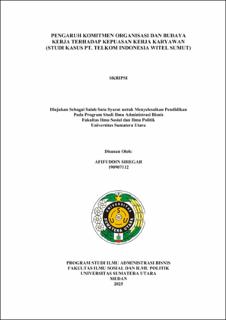| dc.contributor.advisor | Sihombing, Marlon | |
| dc.contributor.author | Siregar, Afifuddin | |
| dc.date.accessioned | 2025-09-22T07:03:41Z | |
| dc.date.available | 2025-09-22T07:03:41Z | |
| dc.date.issued | 2025 | |
| dc.identifier.uri | https://repositori.usu.ac.id/handle/123456789/108540 | |
| dc.description.abstract | Realizing the importance of human resource management (HR) in achieving organizational goals, companies and leaders need to increase their attention to their employees in an effort to increase organizational commitment. HR management was created to establish a viable corporate culture, and include programs that reflect and support the core values of the company and ensure its success.
This research aims to analyze the influence of organizational commitment and work culture on employee job satisfaction. The influence of organizational commitment and work culture will be analyzed partially and simultaneously on employee job satisfaction.
The form of research used in this research is quantitative research with an associative approach. Sampling was carried out through a saturated sampling technique with 35 respondents as samples. The primary data used in this study were obtained by distributing questionnaires directly while skunder data were obtained through literature studies. The data analysis methods used are validity test, reliability test, classical assumption test, multiple linear regression test, and hypothesis test.
The results of the research conducted show that the variables organizational commitment (X1) and work culture (X2) have a significant effect on employee job satisfaction (Y) and all independent variables simultaneously (simultaneously) influence employee job satisfaction (Y). The determinant coefficient test shows that there is a fairly close relationship between organizational commitment (X1) and work culture (X2) on employee job satisfaction with an R value of 0.713. Through the adjusted R square value, it is also known that the variables between organizational commitment (X1) and work culture (X2) contribute 47,8% to the employee job satisfaction variable while the remaining 52,2% is influenced by other variables not discussed in this research. | en_US |
| dc.language.iso | id | en_US |
| dc.publisher | Universitas Sumatera Utara | en_US |
| dc.subject | Organizational Commitment | en_US |
| dc.subject | Work Culture | en_US |
| dc.subject | Employee Job Satisfaction | en_US |
| dc.title | Pengaruh Komitmen Organisasi dan Budaya Kerja Terhadap Kepuasan Kerja Karyawan (Studi Kasus PT. Telkom Indonesia Witel Sumut) | en_US |
| dc.title.alternative | The Effect of Organizational Commitment and Work Culture on Employee Satisfaction (Case Study of PT. Telkom Indonesia Witel Sumut) | en_US |
| dc.type | Thesis | en_US |
| dcterms.subject | SDGs | |
| dc.identifier.nim | NIM190907112 | |
| dc.identifier.nidn | NIDN0016085904 | |
| dc.identifier.kodeprodi | KODEPRODI63211#Ilmu Administrasi Bisnis | |
| dc.description.pages | 142 Pages | en_US |
| dc.description.type | Skripsi Sarjana | en_US |
| dc.subject.sdgs | SDGs 4. Quality Education | en_US |


